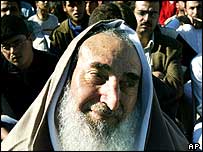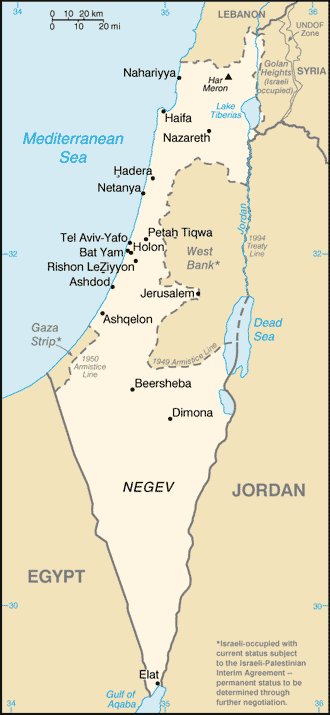
Dynamics

|
Generational Dynamics |
| Forecasting America's Destiny ... and the World's | |
| HOME WEB LOG COUNTRY WIKI COMMENT FORUM DOWNLOADS ABOUT | |
Israeli Prime Minister Ariel Sharon had warned Sheikh Ahmed Yassin, the spiritual leader of Palestinian militia group Hamas, that he would be targeted for assassination if the suicide bombings continued, and today that warning was fulfilled, when Israeli helicopter gunships hit Sheikh Yassin in his wheelchair as he left for a mosque at Monday daybreak.
 |
Yassin has been described as a Palestinian "moderate," and although Israel and America have both called him a terrorist (which he undoubtedly is), the word "moderate" fits his generational profile.
Israel and Palestine today are replaying their last crisis war: It began in 1936 with rock-throwing and low-level violence between Palestinians and Jews, and intensified over the following years, reaching full-scaled genocidal war after the partitioning of Palestine and the creation of Israel in 1948. Yassin himself became a paraplegic during this period, and has been confined to a wheelchair all his life.
Yassin is in the generation that grew up during that war. His childhood was marked by genocide and violence all around him, fear for his own safety and the safety of his family, and continually mourning the loss of friends and family to war. Kids who grow up during such a crisis war suffer a kind of generational child abuse and, like all abused children, grow up to risk-averse adults who look for compromises to contain problems, rather than risk another crisis war like the one they grew up in.
Yassin is a little younger than Yasser Arafat, who was born in 1929, but both of them would look for any way to avoid a new crisis war. As I explained in my book and elsewhere on this web site, from their point of view suicide bombings are actually a compromise. They approve of these terrorist acts because they consider them the lesser of two evils. They recognize the signs -- that Palestine and Israel could break out into another genocidal war at any time.
As leader of Hamas, Yassin was a revered leader of the younger Palestinians, who would bow to his counsel. The younger Palestinians don't fear war because they believe that in the case of all out war the Palestinians will overrun Israel. They are being held back by Arafat and Yassin.
So the assassination of Yassin is a double blow to hopes for peace: First, it fuels the desires of younger Palestinians for all out war, and second, it removes a person of great influence in a generation which is more moderate than younger leaders like Hezbollah militia group leader Hasan Nasrallah.
History shows that major crisis wars are always preceded by "ping-pong" acts of terrorism. Such acts have been going on for years.
Meanwhile, last week's terrorist acts in Madrid, involving the bombing of passenger trains, have terrorized and infuriated Europeans to an extent not seen before. This is causing a hardening of opinions throughout Europe, much of it anti-American and anti-Israeli. Each of these incidents reduces the spirit of compromise and problem containment that has promoted international cooperation since the end of World War II.
My book and this web site have predicted that the probability of all-out regional war in the Mideast is almost a mathematical certainty, and you can now see the intensity growing.
It's impossible to predict exactly when the Mideast will explode into major regional war, but it's fairly certain to happen in the next few years.
The first volume Winston Churcill's monumental history of World War II was entitled The Gathering Storm, in which he described how 1930s Europe proceeded, step by step, to war.
Today I feel like I'm watching a movie version of The Gathering Storm, this time focused on the past few years.
 |
Major wars don't start from nothing. There are almost always acts of "ping-pong terrorism" leading up to the war, with each side's brinkmanship surprising the other by crossing a new line in response to the other sides' brinkmanship. That's what we've been seeing in the Palestine region starting with the 1989 Intifada, continuing with increasing acts of violence on both sides, with a major jump in conflict coming with the suicide bombings that began in September, 2000.
There were three major events this week that further inflamed the Mideast:
Hamas had already promised major retaliation for the assassination of Yassin, but it's now become a matter of Islamic honor to force Israel to pay for the double assassination, and for Bush's change in policy. We're now going to see Palestinians become increasingly inflamed, of course, but we're also going to see much increased anger on the part of the identity groups -- Arabs and Muslims in other countries.
Following Bush's statements, Yasser Arafat and other Palestinian leaders were openly rejecting Mideast roadmaps and peace proposals for the first time. You can be fairly certain that Arabs in Muslims in Egypt, Syria, Iran, Saudi Arabia and other countries are far more willing to cooperate with the Palestinians to strike a major blow at Israel.
Expect major new regional violence by the end of 2004, and "The Gathering Storm" movie to continue to an inevitable conclusion.